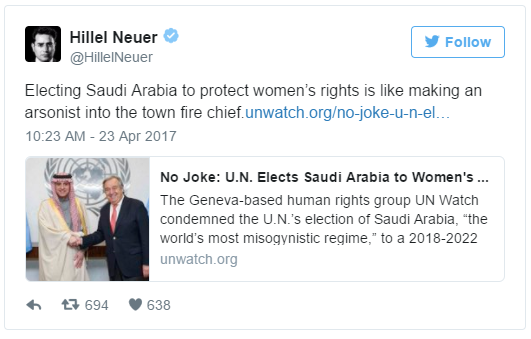No Joke: U.N. Elects Saudi Arabia to Women’s Rights Commission, For 2018-2022 Term

The Geneva-based human rights group UN Watch condemned the U.N.’s election of Saudi Arabia, “the world’s most misogynistic regime,” to a 2018-2022 term on its Commission on the Status of Women, the U.N. agency “exclusively dedicated to the promotion of gender equality and the empowerment of women.”
“Electing Saudi Arabia to protect women’s rights is like making an arsonist into the town fire chief,” said Hillel Neuer, executive director of UN Watch. “It’s absurd.”
“Every Saudi woman,” said Neuer, “must have a male guardian who makes all critical decisions on her behalf, controlling a woman’s life from her birth until death. Saudi Arabia also bans women from driving cars.”
“I wish I could find the words to express how I feel right know. I’m ‘saudi’ and this feels like betrayal,” tweeted a self-described Saudi woman pursuing a doctorate in international human rights law in Australia.
Yet the fundamentalist monarchy is now one of 45 countries that, according to the U.N., will play an instrumental role in “promoting women’s rights, documenting the reality of women’s lives throughout the world, and shaping global standards on gender equality and the empowerment of women.”
Saudi Arabia was elected by a secret ballot last week of the U.N.’s 54-nation Economic and Social Council (ECOSOC). Usually ECOSOC rubber-stamps nominations arranged behind closed doors by regional groups, however this time the U.S. forced an election, to China’s chagrin.
Saudi Arabia was also recently re-elected to the U.N. Human Rights Council where it enjoys the right to vote on, influence and oversee numerous mechanisms, resolutions and initiatives affecting the rights of women worldwide, including:
- Elimination of discrimination against women
- Equal participation [of women] in political and public affairs
- Working Group on the issue of discrimination against women in law and in practice
- Special Rapporteur on violence against women, its causes and consequences
- Accelerating efforts to eliminate all forms of violence against women
- The right to a nationality: women’s equal nationality rights in law and in practice
- Addressing the impact of multiple and intersecting forms of discrimination and violence in the context of racism, racial discrimination, xenophobia and related intolerance on the full enjoyment of all human rights by women and girls
- Annual full day debate on women’s rights
- Annual half-day panel on the integration of a gender perspective
The latest ECOSOC vote is reported in a U.N. press release:
Commission on the Status of Women: The Council elected by secret ballot 13 members to four-year terms, beginning at the first meeting of the Commission’s sixty-third session in 2018 and expiring at the close of the sixty-sixth session in 2022: Algeria, Comoros, Congo, Ghana and Kenya (African States); Iraq, Japan, Republic of Korea, Saudi Arabia and Turkmenistan (Asia-Pacific States); and Ecuador, Haiti and Nicaragua (Latin American and Caribbean States).
The only good news: thanks to the U.S. calling a vote — breaking with the Obama Administration policy which in 2014 allowed Iran to be elected by acclamation — Saudi Arabia was not elected by acclamation, but instead received the least votes of any other country: 47 out of 54 votes cast, even though there was no competition given that there was an equal amount of competitors for available seats.
Here were the results of the elections, with all 54 ECOSOC members voting:
African States
Algeria: 54
Comoros: 53
Congo: 53
Ghana: 53
Kenya: 53
Asian & Pacific States
Iraq: 54
Japan: 53
Republic of Korea: 54
Saudi Arabia: 47
Turkmenistan: 53
Latin American States
Ecuador: 54
Haiti: 54
Nicaragua: 52
*
It was a secret ballot, but the math tells us that at least 15 of the following democratic member states of the U.N. Economic and Social Council voted to elect Saudi Arabia to the U.N.’s women’s rights commission:
- Andorra
- Argentina
- Australia
- Belgium
- Brazil
- Chile
- Colombia
- Czech Republic
- Estonia
- France
- Germany
- India
- Ireland
- Italy
- Japan
- Norway
- Republic of Korea
- South Africa
- Spain
- Sweden
- UK
- USA




